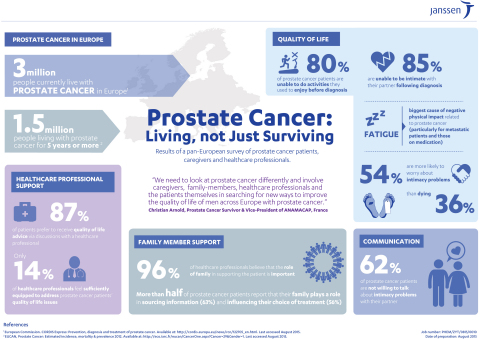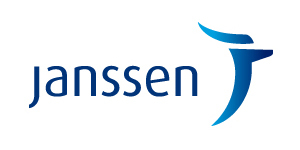BRUSSELS, Belgium--(BUSINESS WIRE)--A new report released today entitled Prostate Cancer: Living, not Just Surviving, which details the findings from a large pan-European survey of 765 prostate cancer patients, 335 caregivers and 400 healthcare professionals, reveals that only 14 per cent of healthcare professionals feel that they have sufficient resources to address quality of life issues, such as fatigue, pain and intimacy problems.1
Developed by Janssen in collaboration with pan-European and national patient associations, the survey reveals that for the patients who experience chronic physical effects from the disease, fatigue (66%) has the biggest negative impact compared to disability and pain (41% and 22% respectively), particularly in metastatic patients (93%) and patients on medication (83%). Almost half of all men with prostate cancer surveyed (n=765) state that they are so tired, they no longer feel able to exercise and 74 per cent of this group say that this has had a negative effect on them emotionally.
It also suggests that men with prostate cancer worry more about quality of life issues associated with their disease, such as intimacy problems (54%) and feeling ill (41%), than dying (36%).
Professor Louis Denis, Onco-Urologist and Strategic Consultant, Europa Uomo said: “Prostate cancer is increasingly considered to be a chronic illness, as many men with the disease are now living longer. This opens up a new challenge for healthcare professionals, and the patients themselves, to place just as much focus on managing quality of life issues as they do on addressing survival.”
“Patient advocacy groups, such as Europa Uomo, can play an important role in supporting prostate cancer patients who are struggling emotionally and physically with their disease by providing the right up-to-date information on managing quality of life issues. They can also act as an avenue for patients and caregivers to connect and share their experiences with others who are living with the disease.”
The report reveals that almost all healthcare professionals (92%) surveyed believe that they proactively provide advice to patients on ways to improve their physical and emotional wellbeing. Conversely, only 14% of patients can recall their doctor advising them on ways to improve their physical and emotional well-being, aside from using medication.1
Dr Maria De Santis, Cancer Research Unit, University of Warwick, UK, said: “Communication is key. We hope that by having a greater understanding of the everyday individual experiences of patients and their caregivers, we as healthcare professionals, may be able to tailor the way we manage the disease to provide a more personalised and holistic approach to care.”
She continued: “Managing quality of life is extremely important in the overall process of caring for a patient with prostate cancer. However, many different methods of measuring quality of life exist, and healthcare professionals may not always be trained in or even aware of these methods. Healthcare professionals may therefore benefit from a single, simple, internationally-recognised quality of life measure to provide a consistent way to identify each patient’s needs.”
Jane Griffiths, Company Group Chairman, Janssen Europe, the Middle East and Africa (EMEA), said: “At Janssen we know that effective prostate cancer management goes beyond the provision of life-prolonging medicines. As prostate cancer is increasingly becoming a long-term and chronic disease, it is important that we work together to support men and their families to manage the quality of life issues related to the disease.”
“We hope that by shedding light on the experiences of patients, caregivers and healthcare professionals in Europe, this report will improve our understanding of how emotional, social issues and physical problems related to prostate cancer can be more effectively addressed through tailored personalised care.”
Latest prostate cancer figures show that there are currently three million men living with the disease in Europe2 and that the number is continuing to rise, with an increase of over 150% across more than a decade (1999 – 2012).3,4 Prostate cancer is the most commonly diagnosed cancer in men, with over 400,000 new cases diagnosed in Europe per year.3
The pan-European survey was carried out in ten countries across Europe by the independent research company, InSites Consulting. The Prostate Cancer: Living, not Just Surviving report can be viewed online at: http://www.janssen-emea.com/hpc/reports/Living-prostate-cancer
-ENDS-
NOTES TO EDITORS
About the Prostate Cancer: Living not Surviving survey
The Prostate Cancer: Living, not Just Surviving survey was initiated on the recommendation of an independent European patient advocacy group panel, which identified a need to improve support for men with prostate cancer by focusing on the longer-term, holistic (quality of life) needs of them and their caregivers.
A pan-European survey was then carried out amongst 765 patients, 335 caregivers and 400 healthcare professionals to ascertain their views on the physical and emotional impact of prostate cancer. The survey was undertaken by the independent research company, InSites Consulting.
Participants were recruited from online research panels and through patient association group partners. Patients and caregivers were sourced from ten countries across Europe, including: the UK, Finland, France, Germany, Italy, Norway, Spain, Sweden, The Netherlands and Belgium. Healthcare professionals were surveyed in the UK, France, Germany, Spain and Italy.
The survey was developed and implemented in partnership with the following expert patient advocacy group panel members:
- Professor Louis Denis – Europa Uomo (EU)
- Christian Arnold – Association Nationale des Malades du Cancer de la Prostate (ANAMACAP) (FR)
- David Smith and Hugh Gunn – Prostate Cancer Support Federation (Tackle Prostate Cancer) (UK)
- Ian Banks – European Men’s Health Forum (EMHF) (EU)
- Calle Waller – Prostatacancerförbundet (SWE)
About European Prostate Cancer Awareness Day (EPAD)
EPAD 2015 is taking place in the European Parliament in Brussels on 16th September 2015, hosted and chaired by Mr P. De Backer MEP and co-chaired by Prof. C. Chapple, Secretary General of the European Association of Urology and Mr K. Mastris, Chairman of Europa Uomo.
EPAD 2015 aims to raise awareness, understanding and knowledge of the management of prostate diseases in general and prostate cancer in particular, and to highlight their significant impact on men across Europe and the burden on European social health care.
The event brings together key policy makers, scientific experts and European associations working in the urological field and representatives of European patient groups with an interest in prostate disease. During this event several experts will discuss the impact of living with benign prostatic enlargement and prostate cancer and how we can improve care and empower patients in the future.
About Metastatic Castration-Resistant Prostate Cancer (mCRPC)
Metastatic castration-resistant prostate cancer occurs when cancer has metastasised (spread) beyond the prostate to other parts of the body and the disease progresses despite serum testosterone below castrate levels.5
The prostate is a gland in men that produces part of the seminal fluid and is located around the urethra (under the bladder). In some cases, cancer of the prostate can grow slowly. However, depending on factors including characteristics specific to the patient and the tumour, prostate cancer also can grow very quickly and spread widely.6
In 2012, over 400,000 new cases of prostate cancer were diagnosed in Europe, and nearly 92,000 men died from the disease.3
About Janssen
Janssen Pharmaceutical Companies of Johnson & Johnson are dedicated to addressing and solving the most important unmet medical needs of our time, including in oncology (e.g. multiple myeloma and prostate cancer), immunology (e.g. psoriasis), neuroscience (e.g. schizophrenia, dementia and pain), infectious disease (e.g. HIV/AIDS, hepatitis C and tuberculosis) and cardiovascular and metabolic diseases (e.g. diabetes). Driven by our commitment to patients, we develop sustainable, integrated healthcare solutions by working side-by-side with healthcare professionals, based on partnerships of trust and transparency. More information can be found on www.janssen-emea.com. Follow us on www.twitter.com/janssenEMEA for our latest news.
About Janssen in Oncology
In oncology, our goal is to fundamentally alter the way cancer is understood, diagnosed, and managed, reinforcing our commitment to the patients who inspire us. In looking to find innovative ways to address the cancer challenge, our primary efforts focus on several treatment and prevention solutions. These include disease area strongholds that focus on haematologic malignancies and prostate cancer; cancer interception with the goal of developing products that interrupt the carcinogenic process; biomarkers that may help guide targeted, individualised use of our therapies; as well as safe and effective identification and treatment of early changes in the tumour microenvironment.
# # #
References
1 ‘Prostate Cancer: Living not just surviving’ report. Available at: http://www.janssen-emea.com/hpc/reports/Living-prostate-cancer
2 European Commission. CORDIS Express: Prevention, diagnosis and treatment of prostate cancer. Available at: http://cordis.europa.eu/news/rcn/122705_en.html. Last accessed August 2015.
3 Ferlay J et al. Cancer incidence and mortality patterns in Europe: Estimates for 40 countries in 2012. Eur J Can. 2013;49:1374– 1403.
4 Sant M et al. EUROCARE-4. Survival of cancer patients diagnosed in 1995–1999. Results and commentary. Eur J of Can. 2009;45:931991.
5 Hotte SJ, Saad F. Current management of castrate-resistant prostate cancer. Curr Oncol. 2010 September; 17 (Supplement 2): S72–S79.
6 Mayo Clinic. Prostate Cancer. Available at: http://www.mayoclinic.com/health/prostate-cancer/DS00043. Last accessed August 2015.





